Diverse religious leaders are on the front lines of defending U.S. democracy and working with elected leaders to build a more just and equitable world. This year, they are championing major progressive change, including the American Rescue Plan that will cut child poverty in half and the American Jobs Plan that will fund violence prevention programs and support the creation of well-paying jobs that will bolster the U.S. economy and climate.
The January 6 insurrection at the U.S. Capitol brought attention to the strong ties between Christian nationalism and violent white supremacy. Yet this toxic combination is far from the only expression of religion in public life. Faith leaders in the United States have long played an active role in fighting for justice and supporting vulnerable communities. Now, after four years of resisting policies that denied the dignity and rights of all people, they are working to rebuild the country.
The Center for American Progress’ Faith and Progressive Policy Initiative has identified 21 of the many faith leaders who are instrumental in enacting progressive change. Their work is described briefly below, along with insights they shared with the authors about how their faiths inform their work.
Past editions of the Faith Leaders to Watch annual series can be found here.
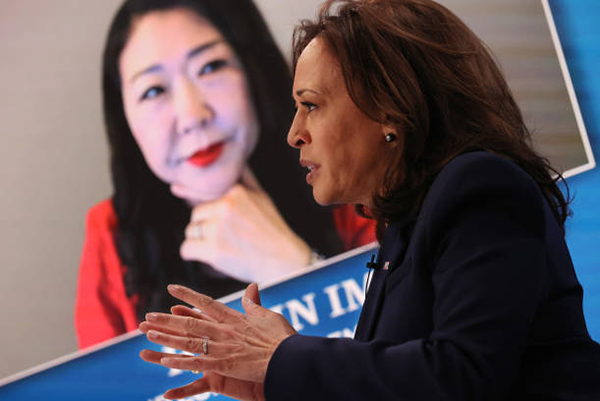
Hyepin Im
Hyepin Im is the founder and president of Faith and Community Empowerment, a nonprofit organization that empowers the Korean and Asian American community in Los Angeles and across the country. During the 2020 presidential election, she was a volunteer leader in the Asian American and Pacific Islander Christians for Biden coalition. She previously served as a member of the board of directors of the Corporation for National and Community Service.
According to Im:
My faith informs me that every person and community has a God-given light. Matthew 5:16 states to let our light shine before men so that others may see our good works and praise our Father in heaven. Unfortunately, many communities either do not know how to shine our light or are never given the platform to do so. I started Faith and Community Empowerment to create a voice for the Asian American community and to equip faith leaders on how to engage with the broader community, leverage resources to create better impact, and shine their light. It gives me great joy to see the Asian American community and the faith community become welcomed, influential, and valued stakeholders. Ultimately, God is honored.
Rabbi Danya Ruttenberg
Rabbi Danya Ruttenberg has served as the scholar-in-residence at the National Council of Jewish Women since August 2020. She has authored seven books and has written for outlets including The Washington Post, The New York Times, The Atlantic, and Newsweek. She lives in the Chicago area.
Ruttenberg told the authors:
As a Jew, I am commanded by the Torah to fight for a just society—one with systems and structures that protect and empower everyone, especially those who are most marginalized and vulnerable. My tradition teaches that we serve God when we care for one another, and this principle animates all of my work at the National Council of Jewish Women, where we strive to improve the lives and rights of women, children, and families through grassroots education and advocacy work—including a 1,000-strong network of Rabbis for Repro—and in all of my writing and public scholarship.
The Rev. Michael-Ray Mathews
The Rev. Michael-Ray Mathews is the deputy director and chief faith officer of Faith in Action, formerly known as the PICO National Network. He is also the president of the board of the directors of the Alliance of Baptists, a national network of progressive Baptist churches. Mathews is a visiting professor of public theology at the Berkeley School of Theology, a senior fellow at Auburn Seminary in New York, and the host of the Prophetic Resistance podcast.
According to Mathews:
As a product of the prophetic tradition of the Black Church, I am committed to conjuring new visions for a multiracial and multifaith movement for justice and healing. If we are not cultivating a moral imagination together, we will continually find ourselves living inside someone else’s. People of moral courage must dare to imagine a world where human dignity replaces human hierarchy, where economic and ecological abundance replaces scarcity and exploitation, and where belonging replaces hyperindividualism. It is time to put deadly narratives and unjust structures to rest. It is time to rebuild the very soul of our society and world.
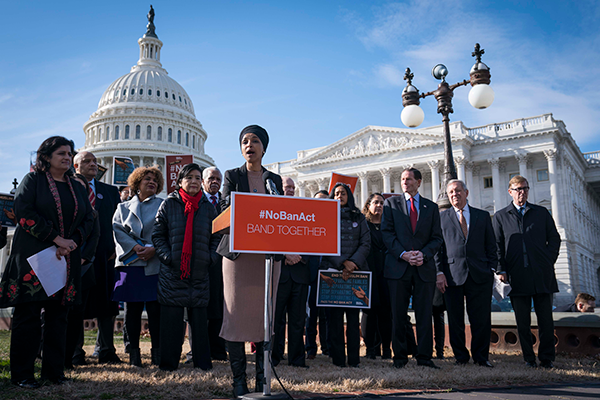
Farhana Khera
Farhana Khera is the president and executive director of Muslim Advocates, a civil rights organization based in Washington, D.C. Her work has been instrumental in advocating for an end to former president Donald Trump’s Muslim ban on the first day of the Biden administration and calling on Congress to pass the No Ban Act to ensure that a religious litmus test can never again be placed on the nation’s immigration system. Prior to joining Muslim Advocates in 2005, Khera served as counsel to the U.S. Senate Judiciary Subcommittee on the Constitution, Civil Rights, and Property Rights.
Khera told the authors:
Like many American Muslims, my faith has always informed my values and my persistent desire for justice. Growing up as one of the few Muslims in Painted Post, New York, I learned the value of community and diversity. As an attorney and congressional staffer during 9/11 and the years that followed, I learned to fight for my community’s rights and dignity. Now, as the head of Muslim Advocates, I’m using everything I’ve learned to ensure that American Muslims, and all people, can live their lives free from hate.
Jamie Manson
Jamie Manson was named president of Catholics for Choice in October 2020. Prior to assuming this position, she was a reporter and columnist for the National Catholic Reporter, where she focused on LGTBQ rights and reproductive freedom.
Manson said:
As a lesbian, pro-choice Catholic, I claim my Catholic identity every day because two of the most fundamental beliefs in our tradition make meaning of my life and my work: our social justice teaching and our sacramental view of the world. Every day, I see Catholic leaders turn doctrine into an instrument of violence, both in the United States and abroad, to deny women and LGBTQ people dignity and equality and to obstruct all people from the reproductive health care that is essential to their freedom and flourishing. It pains me to see my faith used and abused in this way. So, I struggle every day to honor what is most life-giving in the Catholic tradition and to dismantle the teachings that do harm.
Jemar Tisby
Jemar Tisby joined Boston University’s Center for Antiracist Research as the assistant director of narrative and advocacy in March 2021. He is the author of the New York Times bestseller The Color of Compromise and president of The Witness, a Black Christian collective. He is also a co-host of the Pass the Mic podcast.
Tisby told the authors:
Where some people erect an artificial barrier between Jesus and justice, my faith tells me that Jesus is all about justice. Loving our neighbors means wanting for others what we want for ourselves. This kind of love goes alongside and is inseparable from loving God. Faith leaders right now have what is perhaps a once-in-generation opportunity to expand the aperture of justice and participate in the civil rights movement of our day.
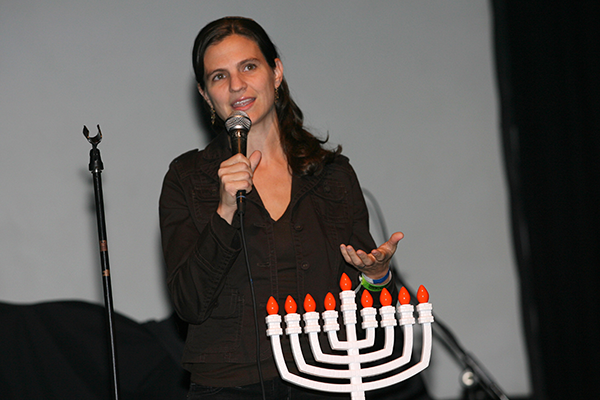
Rabbi Sharon Brous
Rabbi Sharon Brous is the founding and senior rabbi of IKAR, an innovative Jewish spiritual community in Los Angeles. She spoke at the National Prayer Service, organized by the National Cathedral in partnership with the Presidential Inaugural Committee, on Thursday, January 21, which was attended virtually by President Joe Biden and Vice President Kamala Harris. She also led the White House Passover Seder on March 25, 2021. Brous is a senior fellow at Auburn Seminary in New York and serves on the national steering committee for the Poor People’s Campaign.
Brous told the authors:
In a time of great upheaval and great possibility, faith leaders must be voices of moral courage and sources of spiritual strength. My Jewish tradition calls me to imagine and then help manifest a world in which every person is seen and treated as an image of the Holy One. Our work is to lay the foundation for a society built on love, rooted in justice, and propelled by our moral imagination.
Mary Novak
Mary Novak started as the new executive director of NETWORK Lobby for Catholic Social Justice on April 1, 2021. She succeeded Sister Simone Campbell, who was named a CAP faith leader to watch in 2013. Novak was previously the associate director of mission integration at the Georgetown University Law Center, where she was also an adjunct professor. She was the founding board chair of Catholic Mobilizing Network, which works to abolish the death penalty.
According to Novak:
My grounding in the Catholic intellectual and social tradition, lived through my Ignatian spirituality, motivates my work to transform federal policies and shapes me as a restorative justice practitioner. This prophetic, living tradition compels me to act out of a faith doing justice that is inclusive, centered on race and human dignity, and trauma-informed. Catholic sisters founded NETWORK to center those who are forced to the margins by our systems and structures. For me, this praxis is an essential place of connection, solidarity, and inspiration. Society has prioritized the powerful for too long.
Anthea Butler
Anthea Butler, Ph.D., is an associate professor of religious studies and Africana studies and interim chair of religious studies at the University of Pennsylvania. She served as a co-chair of Catholics for Biden during the 2020 presidential election. Butler released her new book, White Evangelical Racism, in March 2021 and serves as a columnist for MSNBC.
Butler said:
My faith is personal, yet the actions I engage in daily show my personal faith and how I am committed to equality and justice for the marginalized and oppressed. While there is a tendency, especially in the American context, to talk about one’s personal faith, for me, the words of the 32nd General Congregation of the Society of Jesus define my public faith and advocacy: “The Service of Faith in Promotion of Justice.” Prophetic work is not platitudes but engaging in justice and advocacy even when it is painful.
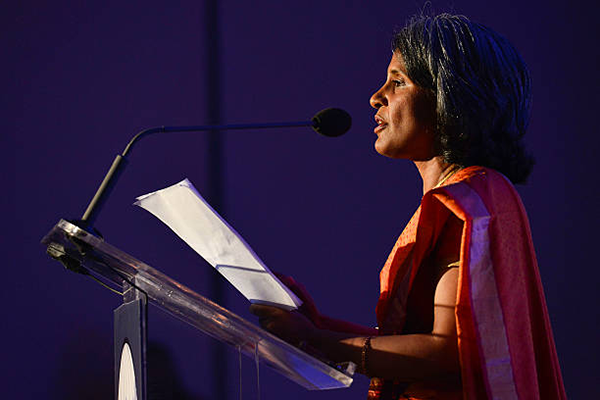
Sunita Viswanath
Sunita Viswanath co-founded and sits on the board of both Hindus for Human Rights and Sadhana, a coalition of progressive Hindus. She is also the founder and board chair of Women for Afghan Women and serves as the Hindu religious life adviser at Columbia University.
According to Viswanath:
My faith teaches me to strive to be radically inclusive and egalitarian, seeing the world as one, seeing the divine in the face of everyone I encounter, seeing the joys and sorrows of others as my own. And also, to stand firm and fearless as I do my best to do my dharma (right action) according to who I am and what I stand for, remembering Lord Krishna’s advice to Arjuna: “It is better to do one’s own dharma imperfectly than someone else’s dharma perfectly.” If we truly live by these teachings, there can be no “other.”
Shantha Ready Alonso
Shantha Ready Alonso was, until recently, the executive director of Creation Justice Ministries, where her work focused on environmental justice through a faith lens of care for God’s creation. In January 2021, she was appointed as the director of intergovernmental and external affairs at the U.S. Department of the Interior. Alonso, who is Catholic, previously served at NETWORK Lobby for Catholic Social Justice and the National Council of Churches.
Alonso told the authors:
Love of God, creation, and each other is at the heart of my faith journey. My desire to uphold the integrity of God’s creation stems from my love for our Creator. My commitment to environmental justice is part of following Jesus’ commandment to love our neighbor.
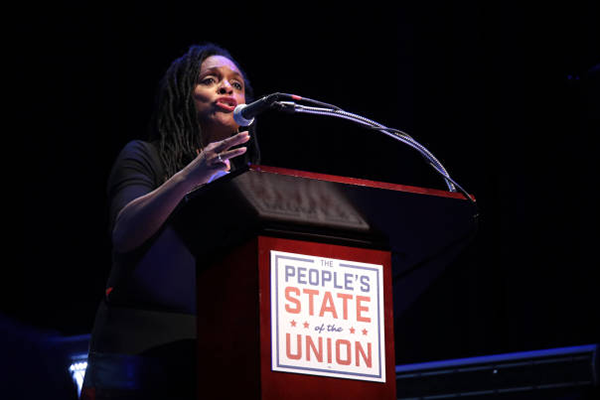
The Rev. Jacqui Lewis
The Rev. Jacqui Lewis, Ph.D., is the senior minister of Middle Collegiate Church in New York City, whose building was almost destroyed by a fire in December 2020. Ordained in the Presbyterian Church (USA), Lewis is the author of the forthcoming book Fierce Love: A Bold Path to a Better Life and a Better World. She also organizes the annual Revolutionary Love Conference at Middle Collegiate Church and is a senior fellow at Auburn Seminary in New York.
Lewis said:
When I was a little girl, I loved watching my mom doing everything! Her laughter, tears, joy, sadness, and her faith shaped me and the lens through which I view the world. From Mom, I learned Black folks’ religion as the way toward a multiracial, just, fully inclusive, and loving society. She and Dad planted fierce love in my heart as the only force to heal souls and the world. This is my faith. Love God, neighbor, and self fiercely. Love. Period. Everything else is commentary.
Rob Taber
Rob Taber, Ph.D., is an assistant professor in Latin American history at Fayetteville State University in North Carolina. Although he does not consider himself a “faith leader,” he is an undoubtedly influential voice of faith as a political organizer and consultant working in the Latter-day Saints (LDS) community. During the 2020 presidential election, he was the national leader of the LDS for Biden-Harris volunteer coalition group.
Taber told the authors:
My dedication is rooted in my reading of the Book of Mormon, an account in which societies are torn apart by wealth inequality, racism, militarism, sexism, environmental degradation, and lack of concern for the poor, the sick, or the rising generation—and that account’s last prophet charges readers to “be more wise than we have been.” It has been invigorating to build a community of Latter-day Saints focused on the civic work of creating a more just society: a country that is better for all families, promotes stewardship of our shared world, preserves foundational freedoms, and includes a stronger platform for self-reliance while helping fulfill our moral obligations to one another.
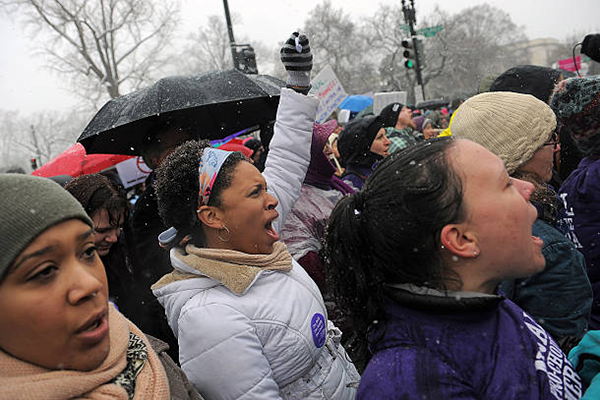
Angela Ferrell-Zabala
Angela Ferrell-Zabala was named head of movement building at Everytown for Gun Safety in February 2021. She was previously the organization’s chief equity, outreach, and partnerships officer. Before joining Everytown, Ferrell-Zabala worked for Planned Parenthood and the Religious Coalition for Reproductive Choice. Her work has been instrumental in creating strong partnerships between secular social justice organizations and faith communities.
Ferrell-Zabala told the authors:
I’ve always felt a deep pull toward faith and have absorbed so many important principles and practices, not only from my own Christian tradition but also from others. My faith has led me toward social justice, the important work of repairing harm, and engaging in unfettered hospitality. It is that same faith that has squared my shoulders and allowed me to speak up and out in the face of power, on behalf of the most marginalized, even as my own trepidation pulsed through my body. I feel called to make sure that religion and faith are not used as tools of oppression but instead guide us toward our collective liberation.
Michael Vazquez
Michael Vazquez is the director of the Human Rights Campaign (HRC) Foundation’s Religion and Faith Program. He is Catholic and lives in Washington, D.C. Before joining HRC, Vazquez was the co-executive director of Brave Commons, which works to support LGBTQ rights on Christian college campuses.
According to Vazquez:
As a public theologian and organizer, both my personal faith and the collective faith of the movement for our liberation have been central in my pursuit of the common good. Catholicism teaches that we are to hate evil and to love justice, and that is why abolition and an unyielding commitment to the defense of Black LGBTQ lives are the central ethics that drive my work. The way my queerness prophetically intersects with my faith allows me—as it does other LGBTQ faith leaders, theologians, and organizers—to imagine a reality far more just, equitable, and abundant than anything we have ever experienced, and it grants both the resilience and vitality to do the work to get us there.
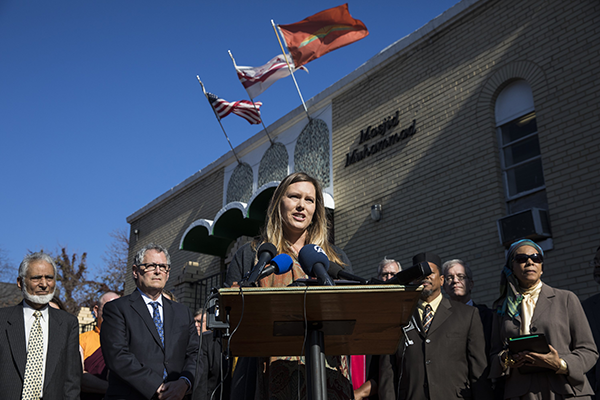
Catherine Orsborn and Nina Fernando
Catherine Orsborn, Ph.D., and Nina Fernando are the outgoing and incoming executive directors, respectively, of the Shoulder to Shoulder campaign. Shoulder to Shoulder mobilizes people of all faiths to counter anti-Muslim bigotry and work in solidarity with the Muslim American community. Orsborn, a Christian who lives in Nashville, Tennessee, has directed the campaign since 2014. Fernando, who comes from a Catholic background and lives in Los Angeles, assumes leadership of the organization this month. Orsborn has assumed a new role as a capacity-building consultant to the El-Hibri Foundation, a philanthropic organization that empowers Muslim leaders and their allies.
Orsborn told the authors:
My faith is grounded in the teachings of Jesus and the prophets of the Hebrew Bible, where I see the constant call for humility, justice, mercy, and love. I’ve deepened and broadened my understanding of my own faith through engagement with people of other faith traditions and backgrounds, and I’m grateful to work alongside people of all and no faiths to together make our country a place of fuller belonging for everyone.
Fernando added:
I come from a Sri Lankan Catholic family, where spirituality, culture, and ritual intertwined into a lived tradition. My faith is informed by liberation and process theologies and rooted in a sense of compassion, justice, and interconnectedness with one another and the world. I believe that when people come together across different faiths, cultures, and backgrounds, we can be a powerful force for social and systemic change. And whether one is moved by a religious tradition or spiritual path or they are motivated by a sense of hope in the possibilities of what this world could be, we each have a vital role to play in building a world we long to see.
Sabrina Dent
Sabrina Dent, who holds a doctorate of ministry, is the senior faith adviser at Americans United for Separation of Church and State. Prior to joining Americans United, Dent worked as the director of programs and partnerships at the Religious Freedom Center of the Freedom Forum. There, she led a three-year project funded by the Henry Luce Foundation, titled “Religious Freedom: African American Perspectives.” She is the co-editor and a contributing author for the recently published book African Americans and Religious Freedom: New Perspectives for Congregations and Communities.
According to Dent:
I exercise my spirituality by practicing human dignity and boldly opposing public policies that promote religious privilege or discrimination of any kind. When religious and nonreligious people come together to hold our elected officials accountable to advocate for a better society that promotes freedom, equality, equity, and justice for all people, this is how we care for the beloved community.
The Rev. Mihee Kim-Kort
The Rev. Mihee Kim-Kort is a Presbyterian minister and a doctoral candidate in religious studies at Indiana University. She is co-minister of the First Presbyterian Church of Annapolis, Maryland. Her recent op-ed, reflecting on the Atlanta shootings from her perspective as a Korean American and religious scholar, was published in The New York Times.
Kim-Kort told the authors:
My faith is the soil out of which my heart, my spirit, seeks to orient itself toward the flourishing of neighbor. I love the local church for all its failings and complexities because, even so, it endeavors to be the hands and feet and heart of Christ in the world. And then, when I’m uncertain or this life weighs too heavily on me, I know that there are others praying for and with me, speaking the words of creeds and confessions, singing the songs, and giving witness to God’s continuous presence. And that presence in the world is liberation, it is abolition and a mutual care for all of creation, human and planetary.
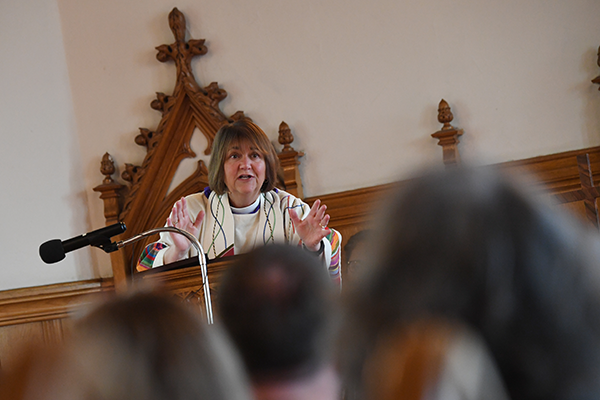
Bishop Karen Oliveto
Bishop Karen Oliveto is the leader of the United Methodist Church’s (UMC) Mountain Sky Episcopal Area. Based in Denver, Oliveto is the first openly lesbian bishop in the UMC. Before being elected to the episcopacy, she served as senior pastor of Glide Memorial UMC in San Francisco.
Oliveto told the authors:
United Methodists are called to a life of personal holiness and social justice—you can’t separate one from the other. As a faith leader, I seek to empower laity and clergy to be guided by love’s demands, where faithful living is expressed by engaging within and beyond the public square to ensure that all voices are heard, that justice and equity underscore all decisions and relationships, and that honoring one another’s dignity is at the heart of all we do. I believe that together we are called to create grace-filled faith communities that bring an embodied word of hope and love to their towns and cities that utterly transform individual lives and entire neighborhoods.
Hazel Gómez
Hazel Gómez is a community organizer, trainer, and curriculum developer. Since 2017, she has worked with the Muslim Power Building Project at Faith in Action, a comprehensive community organizing and leadership development program for Muslims nationwide. Since 2016, she has worked with Dream of Detroit, a nonprofit organization that combines community organizing with housing and land development to build a healthy community and empower a marginalized neighborhood on the west side of Detroit.
According to Gómez:
As a Latina Muslim always striving to be a better community servant, cultivator, and organizer, my faith grounds me in both struggle and hopefulness. … Whether it is within our homes, neighborhoods, or broader society, we are not meant to live in isolation thinking that someone else will do something. Our faith calls each of us to work for, speak for, and pray for justice. We humble ourselves with the reminder that God doesn’t need us. Rather, it is our honor if we become involved with this work, and we ask God to make us a tool for benefiting others.
Looking ahead
The past year has changed American life forever, from the pandemic to the country’s racial reckoning to numerous assaults on U.S. democracy. Faith leaders have provided moral clarity for the nation while also offering pastoral care for their own communities. They are protesting injustice in the streets, leading Zoom-based worship services, delivering food and supplies to neighbors in need, and driving transformative policy change that will benefit communities for generations to come. The challenges facing the nation—to fully recover from the pandemic, address systemic racism, and build a stronger and more sustainable economy—will require religious communities to stay active in support of social justice. The leaders listed here, as well as so many more who went unnamed, will continue to provide this critical service to democracy and justice.
Guthrie Graves-Fitzsimmons is a fellow with the Faith and Progressive Policy Initiative at the Center for American Progress. Maggie Siddiqi is the senior director of the Faith and Progressive Policy Initiative.